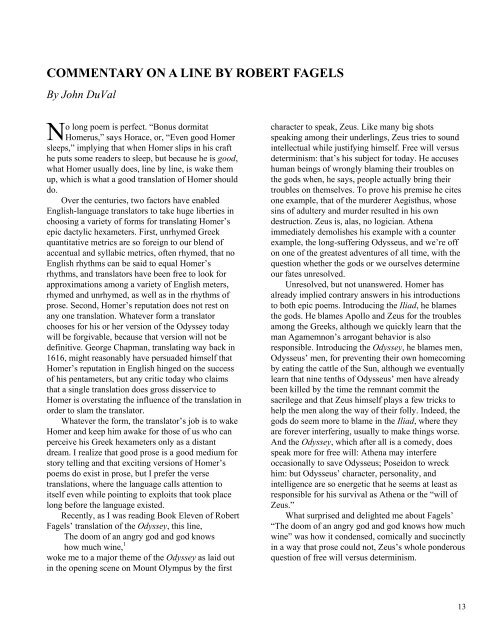their - The University of Texas at Dallas
their - The University of Texas at Dallas
their - The University of Texas at Dallas
You also want an ePaper? Increase the reach of your titles
YUMPU automatically turns print PDFs into web optimized ePapers that Google loves.
COMMENTARY ON A LINE BY ROBERT FAGELS<br />
By John DuVal<br />
N<br />
o long poem is perfect. “Bonus dormit<strong>at</strong><br />
Homerus,” says Horace, or, “Even good Homer<br />
sleeps,” implying th<strong>at</strong> when Homer slips in his craft<br />
he puts some readers to sleep, but because he is good,<br />
wh<strong>at</strong> Homer usually does, line by line, is wake them<br />
up, which is wh<strong>at</strong> a good transl<strong>at</strong>ion <strong>of</strong> Homer should<br />
do.<br />
Over the centuries, two factors have enabled<br />
English-language transl<strong>at</strong>ors to take huge liberties in<br />
choosing a variety <strong>of</strong> forms for transl<strong>at</strong>ing Homer’s<br />
epic dactylic hexameters. First, unrhymed Greek<br />
quantit<strong>at</strong>ive metrics are so foreign to our blend <strong>of</strong><br />
accentual and syllabic metrics, <strong>of</strong>ten rhymed, th<strong>at</strong> no<br />
English rhythms can be said to equal Homer’s<br />
rhythms, and transl<strong>at</strong>ors have been free to look for<br />
approxim<strong>at</strong>ions among a variety <strong>of</strong> English meters,<br />
rhymed and unrhymed, as well as in the rhythms <strong>of</strong><br />
prose. Second, Homer’s reput<strong>at</strong>ion does not rest on<br />
any one transl<strong>at</strong>ion. Wh<strong>at</strong>ever form a transl<strong>at</strong>or<br />
chooses for his or her version <strong>of</strong> the Odyssey today<br />
will be forgivable, because th<strong>at</strong> version will not be<br />
definitive. George Chapman, transl<strong>at</strong>ing way back in<br />
1616, might reasonably have persuaded himself th<strong>at</strong><br />
Homer’s reput<strong>at</strong>ion in English hinged on the success<br />
<strong>of</strong> his pentameters, but any critic today who claims<br />
th<strong>at</strong> a single transl<strong>at</strong>ion does gross disservice to<br />
Homer is overst<strong>at</strong>ing the influence <strong>of</strong> the transl<strong>at</strong>ion in<br />
order to slam the transl<strong>at</strong>or.<br />
Wh<strong>at</strong>ever the form, the transl<strong>at</strong>or’s job is to wake<br />
Homer and keep him awake for those <strong>of</strong> us who can<br />
perceive his Greek hexameters only as a distant<br />
dream. I realize th<strong>at</strong> good prose is a good medium for<br />
story telling and th<strong>at</strong> exciting versions <strong>of</strong> Homer’s<br />
poems do exist in prose, but I prefer the verse<br />
transl<strong>at</strong>ions, where the language calls <strong>at</strong>tention to<br />
itself even while pointing to exploits th<strong>at</strong> took place<br />
long before the language existed.<br />
Recently, as I was reading Book Eleven <strong>of</strong> Robert<br />
Fagels’ transl<strong>at</strong>ion <strong>of</strong> the Odyssey, this line,<br />
<strong>The</strong> doom <strong>of</strong> an angry god and god knows<br />
how much wine, 1<br />
woke me to a major theme <strong>of</strong> the Odyssey as laid out<br />
in the opening scene on Mount Olympus by the first<br />
character to speak, Zeus. Like many big shots<br />
speaking among <strong>their</strong> underlings, Zeus tries to sound<br />
intellectual while justifying himself. Free will versus<br />
determinism: th<strong>at</strong>’s his subject for today. He accuses<br />
human beings <strong>of</strong> wrongly blaming <strong>their</strong> troubles on<br />
the gods when, he says, people actually bring <strong>their</strong><br />
troubles on themselves. To prove his premise he cites<br />
one example, th<strong>at</strong> <strong>of</strong> the murderer Aegisthus, whose<br />
sins <strong>of</strong> adultery and murder resulted in his own<br />
destruction. Zeus is, alas, no logician. Athena<br />
immedi<strong>at</strong>ely demolishes his example with a counter<br />
example, the long-suffering Odysseus, and we’re <strong>of</strong>f<br />
on one <strong>of</strong> the gre<strong>at</strong>est adventures <strong>of</strong> all time, with the<br />
question whether the gods or we ourselves determine<br />
our f<strong>at</strong>es unresolved.<br />
Unresolved, but not unanswered. Homer has<br />
already implied contrary answers in his introductions<br />
to both epic poems. Introducing the Iliad, he blames<br />
the gods. He blames Apollo and Zeus for the troubles<br />
among the Greeks, although we quickly learn th<strong>at</strong> the<br />
man Agamemnon’s arrogant behavior is also<br />
responsible. Introducing the Odyssey, he blames men,<br />
Odysseus’ men, for preventing <strong>their</strong> own homecoming<br />
by e<strong>at</strong>ing the c<strong>at</strong>tle <strong>of</strong> the Sun, although we eventually<br />
learn th<strong>at</strong> nine tenths <strong>of</strong> Odysseus’ men have already<br />
been killed by the time the remnant commit the<br />
sacrilege and th<strong>at</strong> Zeus himself plays a few tricks to<br />
help the men along the way <strong>of</strong> <strong>their</strong> folly. Indeed, the<br />
gods do seem more to blame in the Iliad, where they<br />
are forever interfering, usually to make things worse.<br />
And the Odyssey, which after all is a comedy, does<br />
speak more for free will: Athena may interfere<br />
occasionally to save Odysseus; Poseidon to wreck<br />
him: but Odysseus’ character, personality, and<br />
intelligence are so energetic th<strong>at</strong> he seems <strong>at</strong> least as<br />
responsible for his survival as Athena or the “will <strong>of</strong><br />
Zeus.”<br />
Wh<strong>at</strong> surprised and delighted me about Fagels’<br />
“<strong>The</strong> doom <strong>of</strong> an angry god and god knows how much<br />
wine” was how it condensed, comically and succinctly<br />
in a way th<strong>at</strong> prose could not, Zeus’s whole ponderous<br />
question <strong>of</strong> free will versus determinism.<br />
13

















